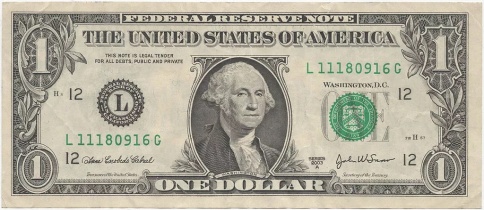
“Dead president” is a slang term for money in the United States. It initially sounds like a silly joke that refers to the images on the printed dollar bills. But if we take this idiom literally, we can envision an unexpected synthesis of Marx and Freud: If money is literally dead president, then the commodity that serves as the universal equivalent in exchange (Marx) embodies a morsel of the sacrificed primal father (Freud). Of course the dollar bill embodies the sacrificed primal father only in fantasy, which is why the bills bear the images of dead presidents.
There is also a song called “Dead Presidents” in which the rapper Jay-Z expresses a desire of money by the words “I’m out for presidents to represent me,” which brings us to Lacan who said that the signifier represents the subject for another signifier. The morsel of the sacrificed primal father in the dollar bill becomes the Master-Signifier that can represent the subject as a customer to be served.
If you have something that you can give to reciprocate the customer’s dead presidents, you are fine. But if you have nothing to give in return, you must sacrifice yourself and give morsels plucked from your own soul to reciprocate the customer’s morsel of the primal father. This means that you are now “selling your labor-power” and the customer thereby becomes your employer. You become the working class who has “nothing to lose but their chains”. The bad news is that you don’t have a “world to win” but only more and more sacrifices to be made in confronting the infinity that the dead presidents represent (Jay-Z: “Representing infinity with presidencies, you know?”).
The bad infinity (Hegel: schlechte Unendlichkeit) of dead presidents wields the power of the fetish. The dead president on the bill is a commemoration (symbolic mourning [1]); it’s a monument with a fetishistic value that people cling to. This means that it is authorized directly by embodying a morsel of the fantasmatic primal father, without further symbolic mediation. When the workers offer to sacrifice themselves in return for the universal equivalent (money) by “selling their labor-power” [2], they appear as the real source of value and are endowed by a fetishistic value of their own: The working-class is proud of being the real source of all surplus-value [3].
But what really matters is instead the surplus-enjoyment of sacrificing oneself for dead presidents. Money engages efforts and settles disputes by the power of fantasy and enjoyment. It remains to be useful just because everybody continues to assume in practice that it is useful. It wields the power of a universal fantasy in order to both cancel and preserve (sublate) the power of people’s individual fantasies.
Money as fetish is a signifier that lets people disavow the ominous signs (e.g. about the climate crisis or the misery of others etc. [4]). This is the mechanism of the Starbucks coffee that Slavoj Žižek tells about: “Just pay a little bit more for our coffee and join our shared disavowal of the capitalist truth, cough cough wink wink!” (coffee = cough-fee)
(Turkish)
Işık Barış Fidaner is a computer scientist with a PhD from Boğaziçi University, İstanbul. Admin of Yersiz Şeyler, Editor of Žižekian Analysis, Curator of Görce Writings. Twitter: @BarisFidaner
Notes:
[1] See “Always Existed and Never Existed”
[2] See “Masculine and Feminine Marxism”
[3] See “Working-Class Pride and Authorization”, “The Perverse Core of Labor-Power: Making Oneself Used”
[4] See “Greta Thunberg and the disavowal of the ominous signs”

[…] [1] Bkz “Sacrifice for Dead Presidents” […]
LikeLike
[…] See “Sacrifice for Dead Presidents”, “Erosion by Drive (Repetition) and Erosion by Desire (Renewal)” (Early Access […]
LikeLike
[…] — Sacrifice for Dead Presidents […]
LikeLike
[…] [1] See “Sacrifice for Dead Presidents” […]
LikeLike
[…] [1] Mecaz-ı mürsel olmadığında mecaz şaşkındır çünkü boşa düşmüştür; mecaz olmadığında ise mecaz-ı mürsel kördür çünkü amaçsızdır. Bkz “Mecaz Hakikatin Köprüsüdür, Mecaz-ı Mürsel Sahiliğin Elçisidir”; Morsel konusunda bkz “Dürtüsel Erozyon (Yineleme) ile Arzusal Erozyon (Yenileme)”, “Sacrifice for Dead Presidents” […]
LikeLike
[…] (İngilizcesi) […]
LikeLike